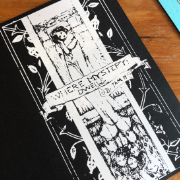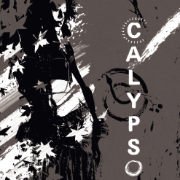Polaris

filed under reviews on 21 Apr 2017
tagged game design and solo
A while ago, when I first became interested in narrative games – wait, let’s go back a little, for some context.
When “the Forge” was in its heydey, I was playing D&D with a group of friends, as I’d been doing for half a decade at that point. We decided, collectively (and with a firm “no no nope” from the more entrenched members of the group), that “conch passing” was not for us, and went back to D&D and d20 modern, with the occasional WoD or GURPS.
So when I took a break from gaming about half a year ago, I was curious, and I looked into all that conch passing stuff that I didn’t really explore then. On the one hand, I’m a little bummed I didn’t get to experience all this at the time, but I don’t think I was ready to switch gears yet, and discovering it now means reaping the benefits of all the accumulated experience, not absorbing it as it comes along.
So, Polaris. I picked this up pretty early in the journey, and was a little baffled why it was considered a narrative masterpiece because it seemed like a really neat setting but fairly traditional, mechanically. Comparing notes with a friend recently, I discovered I’d picked up a very different game than I meant to, one with the same name.
I just now got around to locating the original, and I must say, I’m impressed. The mechanics aren’t exactly how I’d want to play (ritual phrase based conflict resolution is not something I could rope anyone I know into) but there’s a lot to love here.
The goals of playing Polaris are no more and no less than the goals of a child’s play-pretend — to create a good story, to explore an imaginary world, and to have fun doing it.
That about sums up my roleplaying design philosophy, right there, and puts a finger squarely on something I’ve been having trouble articulating – why “just writing a story” is a valid and valuable approach to solo roleplaying.
The conflict resolution determining the course of the story, with a sparse numerical “stat” system that’s basically just a tracker, is also interesting – and something I’m going to be noodling with over the next few days, probably to create an alternate core mechanic for Calypso. That’s kind of the bane of having a design-minded brain, though, you always see opportunities to make “just one more change”!
Anyway, after a good read, I’m pretty sure Polaris isn’t playable solo, or at least that you’d lose a huge part of what makes it fun. But I’m very happy I finally had a chance to read it, and I’m feeling very inspired.


